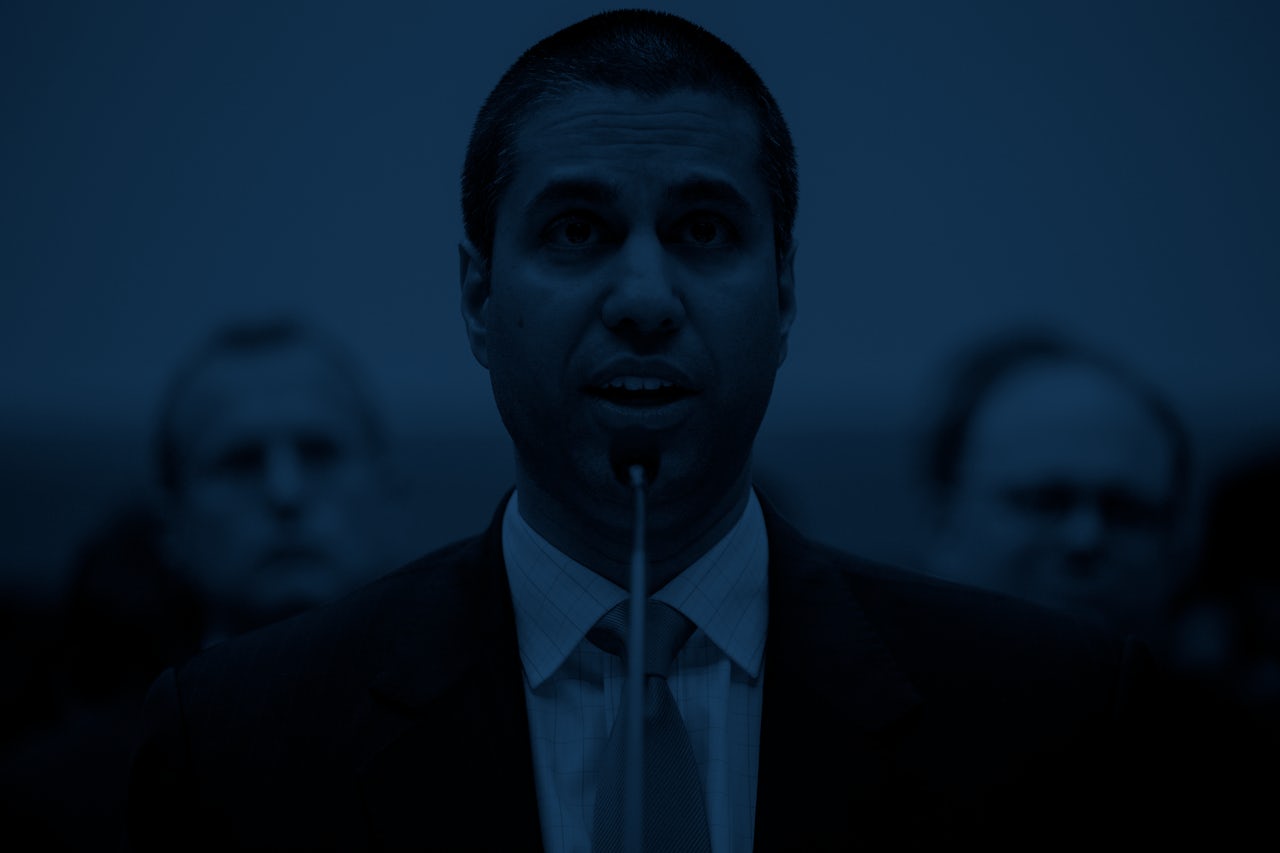Federal Communications Commission (FCC) chairman Ajit Pai announced today that the agency would be rolling back Obama-era regulations on internet service providers, or ISPs. “The more heavily you regulate something, the less of it you're going to get,” he said, arguing that the rules were a case of the government trying to fix something that wasn't broken.
Advocates of net neutrality — the idea that ISPs like Comcast or AT&T should charge the same price and deliver the same speed for all websites — warn that Pai’s plan would be a major step back for consumers. With a Republican president, a Republican Congress, and a pro-deregulation FCC, is the battle for a free and open internet completely lost?
“The threat that we’re now facing is one of the most significant that we have faced in 10 years,” said Timothy Karr, the senior director of strategy at Free Press, a pro-net neutrality organization. “We have [Republican] majorities in both houses of Congress, we have an FCC where the majority is against net neutrality protections, and we also have a White House [with] President Trump, who doesn’t really demonstrate a great deal of knowledge about the internet or what he sometimes call ‘the cyber,’ but nonetheless is willing to let industry lobbyists call the shots on the issue.”
There is still one thing that could save net neutrality from death at the hands of the free market: public pressure from consumers.
Pai seems to want to overturn rules put in place by the Open Internet Order under the Obama administration-era FCC, which categorized ISPs that offer broadband or mobile internet access as telecommunication services under Title II of the Communications Act. That order made it so ISPs can’t charge website and content owners to send their data faster, which could have created a two-tiered internet that favors the wealthy and established.
This regulation hasn’t sat well with ISPs. AT&T and multiple trade associations took the FCC to court, though the US Court of Appeals for the District of Columbia ultimately upheld the FCC’s decision in June 2016. AT&T and others vowed to continue fighting, but not much changed until Donald Trump won the election and appointed Pai as chairman of the FCC.
Pai and those sharing his viewpoint believe that any sort of significant regulation of the internet would curtail the free market’s ability to regulate itself. When the Open Internet Order was enacted, Pai wrote in his dissent that it would cause “higher broadband prices, slower speeds, less broadband deployment, less innovation, and fewer options for American consumers.”
“[Pai] is an avid net neutrality foe,” Karr said. “Now, he would never say that to you, because he likes to say that he loves net neutrality and the open internet, he just wants to do away with any of the rules that make it a reality — which is kind of like saying, ‘I love free speech, but I just want to do away with the First Amendment.’”
The bureaucracy of it will take some time to play out. The current rules took about a year to come into effect. The FCC floated the idea of less-strict rules at first, but a public outcry caused the agency to revise them. The same thing could happen as Pai tries to push his changes through. According to Karr, the support for net neutrality is significant enough that any FCC commission would find it difficult to completely go against the public.
Forcing immensely unpopular rules through the FCC doesn’t just affect Pai, either; it also affects his GOP colleagues in Congress. The President nominates the FCC commissioners, but the Senate has to confirm them, and Pai’s most recent nomination — his five-year term as an Obama appointment having expired — is “currently undergoing committee consideration” according to online records. If he royally screws up here, there’s no telling what the fallout might be.
“It’s no more guaranteed than health care reform,” said Ernesto Falcon, legislative counsel for the Electronic Frontier Foundation, referring to unsuccessful efforts to repeal Obamacare. “What it’s going to come down to is whether the public supports what the GOP wants to do with the internet, and my suspicion is that it’s unlikely.”
“Congress pays very close attention to these sorts of proceedings,” Karr said. “There’s a possibility that, if this proceeding gets bogged down at the FCC, the Republican majority in Congress will try to introduce legislation that would make it easier for Pai to take away net neutrality protections.”
“What it’s going to come down to is whether the public supports what the GOP wants to do with the internet, and my suspicion is that it’s unlikely.”
It just depends on which part of the government picks up the fight, if any. If Pai and the FCC fail to scrub the 2015 order, Congress could attempt legislation to give the FCC clear rules on how to proceed, and if both the FCC and Congress fail, it’s possible that the trade associations that had litigated previously would do so again.
And that’s why, even with the odds stacked against them, advocates are optimistic. It’s a continuing fight, and there’s opportunity to influence policy at every step. Comment on the FCC public docket. Call representatives. Just participating in the fight at all is one of the biggest steps any one person can do. Public opposition is part of what killed the controversial Stop Online Piracy Act (SOPA) in 2012 with grassroots organizations as well as companies like Google and Facebook opposing such a broad expansion of online copyright infringement policies.
“The question has never really been presented in front of the public to respond to what chairman Pai wants to do,” said Falcon. In the past, the FCC’s pretty much only ever worked on how to expand net neutrality regardless of administration. “This is the first FCC chairman that is actively trying to walk it backwards, and kind of abandon his duty to promote the public interest. I suspect there will be incredible pushback, and I think it’ll be sufficient pushback to make a number of Republican Senators and members of the House question where the FCC is going.”
The next step is a vote on a notice of proposed rulemaking on May 18, which will then move Pai's plan into the public comment period. "Going forward, we cannot stick with regulations from the Great Depression that were meant to manage Ma Bell," Pai said. The full text of the proposal will be released Thursday, he said.

